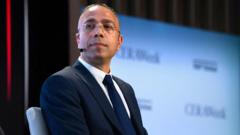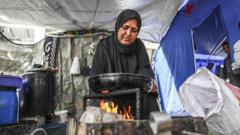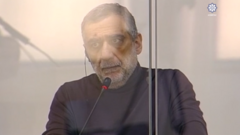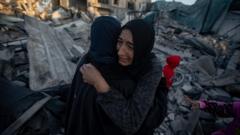The COP29 climate conference in Baku, Azerbaijan, is under scrutiny following revelations involving its chief executive, Elnur Soltanov, who was filmed discussing potential fossil fuel investments under the pretense of promoting sustainability.
COP29 Chief Executive Caught in Controversy Over Fossil Fuel Deals

COP29 Chief Executive Caught in Controversy Over Fossil Fuel Deals
Secret footage unveils Elnur Soltanov's alleged promotion of fossil fuel opportunities, raising ethical concerns at COP29.
The chief executive of COP29 in Azerbaijan, Elnur Soltanov, has come under fire after covert footage showed him discussing fossil fuel investment opportunities. In a clandestine meeting with an individual posing as an investor, Soltanov talked about the development of numerous gas fields within the state-owned oil and gas company Socar. Observers are voicing concern that Soltanov, being both the COP29 chief executive and Azerbaijan's deputy energy minister, is misusing his position for potentially detrimental fossil fuel deals.
In the recorded meeting, Soltanov touted the COP29 conference's goals of addressing climate change and transitioning from hydrocarbon reliance, while simultaneously expressing interest in facilitating discussions about investment opportunities that would still promote oil and gas production. This dichotomy has been branded "unacceptable" by environmental advocates and former UN officials, who regard these actions as a profound betrayal of the climate conference as a platform dedicated to reducing global fossil fuel consumption.
Experts warn that Soltanov's behavior directly contravenes the pledges made by participant nations in prior COP summits to work towards limiting global warming and phasing out fossil fuels. The Intergovernmental Panel on Climate Change (IPCC) has long established that new investments in oil and gas fields are incompatible with the ambitious climate targets set under the Paris Agreement.
Adding to the controversy, leaked emails have revealed that the COP29 team discussed sponsorship deals on behalf of the fictitious investment firm in exchange for introductions to Socar—indicating an apparent attempt to leverage the COP process for commercial gain. This incident follows a troubling trend established during COP28, indicative of ongoing challenges faced by the UN in maintaining the integrity of climate talks and ensuring that they do not devolve into platforms for profit-making ventures in fossil fuels.
Former chief of the UN climate body, Christiana Figueres, expressed outrage at the events, calling them a "betrayal of the COP process" and lamenting the erosion of trust within climate negotiations. Meanwhile, Azerbaijan's COP29 team has not responded to requests for clarification about these matters, leaving the international community concerned about the governance of this year's climate conference and its implications for future climate action.
In the recorded meeting, Soltanov touted the COP29 conference's goals of addressing climate change and transitioning from hydrocarbon reliance, while simultaneously expressing interest in facilitating discussions about investment opportunities that would still promote oil and gas production. This dichotomy has been branded "unacceptable" by environmental advocates and former UN officials, who regard these actions as a profound betrayal of the climate conference as a platform dedicated to reducing global fossil fuel consumption.
Experts warn that Soltanov's behavior directly contravenes the pledges made by participant nations in prior COP summits to work towards limiting global warming and phasing out fossil fuels. The Intergovernmental Panel on Climate Change (IPCC) has long established that new investments in oil and gas fields are incompatible with the ambitious climate targets set under the Paris Agreement.
Adding to the controversy, leaked emails have revealed that the COP29 team discussed sponsorship deals on behalf of the fictitious investment firm in exchange for introductions to Socar—indicating an apparent attempt to leverage the COP process for commercial gain. This incident follows a troubling trend established during COP28, indicative of ongoing challenges faced by the UN in maintaining the integrity of climate talks and ensuring that they do not devolve into platforms for profit-making ventures in fossil fuels.
Former chief of the UN climate body, Christiana Figueres, expressed outrage at the events, calling them a "betrayal of the COP process" and lamenting the erosion of trust within climate negotiations. Meanwhile, Azerbaijan's COP29 team has not responded to requests for clarification about these matters, leaving the international community concerned about the governance of this year's climate conference and its implications for future climate action.





















